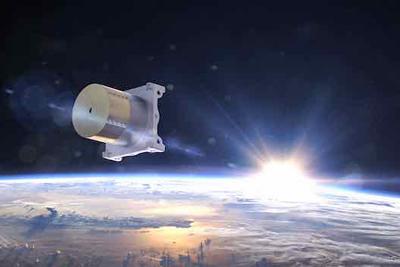Southampton astronautics expertise boosts UK small satellite propulsion technologies

Astronautics engineers from the University of Southampton are supporting two innovative UK projects developing propulsion systems that increase the capabilities of small satellites.
The twin projects, funded through the national SPRINT programme, are building a new water-based propulsion system for CubeSats and the development of a low-cost rocket engine for launching small satellites.
Dr Charlie Ryan from the Southampton Astronautics group is collaborating with UK enterprises Steamjet Space Systems and Protolaunch on the initiatives which grant access to the University’s advanced research facilities.
The new water-based propulsion system being tested and validated by Steamjet Space Systems allows small satellites to stay longer in space, change and optimise their orbit, operate in constellations and de-orbit at the end of their missions.
The system uses water or any other low pressure, non-toxic and non-corrosive fluid as the propellant to create thrust in a low power resistojet. Unlike high pressure cold gas thrusters or hazardous monopropellant systems, the Steamjet propulsion unit is safe for launch-site operations, or storage within the International Space Station, reducing the overall mission risks.
“With space-enabled capabilities including simulations, vacuum chambers and thermal chambers, the University of Southampton offers comprehensive facilities and expertise in propulsion systems,” Charlie says.
“We can validate performances of the basic thruster design and see how it reacts to an in-orbit environment through thermo cycling. This project will be the first time that we’ve used the vacuum chamber to verify a thruster and this will enable us to validate the Steamjet Space thruster as suitable for space flight, subject to ESA/NASA standards.”
The second SPRINT project is focused on developing a novel cooling and pressurisation cycle for a large 7.5 kiloNewton rocket engine for acting as a prototype engine for a small satellite launch vehicle. This will enable the company to develop a proof-of-concept of its engine technology and bring to market a radically lower-cost orbital rocket engine for payloads under 50kg.
“The focus of our innovative and ambitious project with Protolaunch is the chemical thrusters for the launch vehicle,” Charlie says. “This covers the initial paper design and assessment, through to the experimental test run of the engine.
“Using our expertise and facilities such as the chemical propulsion labs and the independent Westcott testing facility in Buckinghamshire, we are able to support the testing of an engine at a component level.”
The development of the low-cost rocket engine will reduce the cost of access to space and enable small satellite operators to take complete control over their orbital timelines and trajectories.